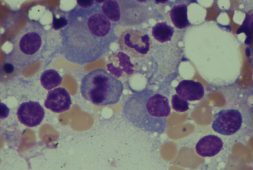
Incorporating the diagnosis and treatment of depression into breast cancer care is crucial due to recent studies emphasizing the importance of improved mental health screening and treatment, particularly for breast cancer patients.
It is understandable that individuals with a cancer diagnosis are more prone to experiencing depression and anxiety. The National Cancer Institute estimates that as many as one in four people with cancer also suffer from depression.
A recent research study published on April 17 in the journal Cancer, which belongs to the American Cancer Society, highlights the potential negative impact of depression on the care and survival rates of women with breast cancer.
The lead author of the study, Bin Huang, PhD, an associate professor at the Markey Cancer Center in Lexington, Kentucky, emphasized that the key finding of the study is the correlation between untreated depression and reduced survival rates among female breast cancer patients. “Depression management is important for breast cancer patients after diagnosis, as is maintaining continuity of care for patients with a depression pre-diagnosis. It can ultimately affect the patient’s long-term survival,” he explained.
A recent study reaffirms previous findings that depression can have a significant effect on cancer survival rates. This study conducted a meta-analysis of over 20,000 patients diagnosed with various types of cancer, including breast cancer. The results revealed that irrespective of the cancer type, the presence of major depression was linked to poorer survival outcomes. Published in the journal Psychosomatic Medicine in 2021, this meta-analysis provides further evidence on the impact of depression on cancer prognosis.
According to the American Cancer Society, breast cancer is responsible for approximately 30 percent of new female cancer cases annually, making it the second most prevalent cancer after skin cancer. The statistics show that there is a one in eight chance for a woman to develop breast cancer in her lifetime.
Depressed Women Post Diagnosis Had a 50 Percent Higher Risk for Dying
Using data from the Kentucky Cancer Registry, researchers identified over 6,000 adult women who were diagnosed with primary invasive breast cancer between 2007 and 2011.
These women were classified into four categories based on their health claims information:
– 86 percent had no depression.
– 3.7 percent had a depression diagnosis only before their cancer diagnosis.
– 6.2 percent had a depression diagnosis only after their cancer diagnosis.
– 4.1 percent had persistent depression, experiencing depression both before and after their cancer diagnosis.
Over a median follow-up period of four years, 26.2 percent of these women passed away.
The study found that having depression before the breast cancer diagnosis was associated with a 26 percent higher risk of death. Additionally, having depression after the diagnosis was linked to a 50 percent higher risk of death compared to women without depression.
These findings emphasize the importance of diagnosing and treating depression during breast cancer diagnosis and throughout the patient’s journey. Dr. Huang highlights that addressing depression can significantly impact patient care and survival outcomes.
“We initially were surprised that the breast cancer patients with a depression diagnosis before and after a cancer diagnosis did not have a higher risk of mortality than the breast cancer patients without a depression diagnosis,” Huang said. “After further consideration, we realized that having a depression diagnosis before and after a cancer diagnosis indicates that patients’ depression may have been well managed, given that underdiagnosis and undertreatment of depression are common among cancer patients.”
He came up with a conclusion and said, “This suggests the importance of depression management in patients’ cancer care.”
Almost 3 Out of 10 Women Didn’t Get Guideline-Recommended Treatment
Furthermore, the investigators in Kentucky evaluated the healthcare provided to participants, aiming to determine its conformity with the breast cancer treatment guidelines established by the National Comprehensive Cancer Network.
The study revealed that approximately 30 percent of patients did not receive the recommended breast cancer treatment as outlined in the guidelines.
“That’s a huge number of patients,” said Preeti K. Sudheendra, MD. She’s a medical oncologist who specializes in breast cancer at the Ohio State University comprehensive cancer center in Columbus. She also was not part of the much discussed study.
In the study, it was found that women who had post-diagnosis depression or persistent depression were equally likely to receive guideline-recommended treatment compared to women without depression. However, women who experienced depression prior to their diagnosis were 25 percent less likely to receive the appropriate care.
According to the study authors, the risk of death was over twice as high for women who did not receive guideline-recommended treatment compared to those who received the recommended care.
Dr. Sudheendra mentions that the research did not focus on investigating the reasons behind the lack of appropriate care for these women. It would be valuable for future investigations to delve deeper into understanding these reasons.
It also makes a lot of sense how depression could affect care, she added. “For example, having preexisting depression before a diagnosis may cause someone to be less engaged in their health or maybe delay a diagnosis or a workup.”
More Research on Depression Treatment Needed
Future studies could investigate how depression may impact care along the treatment continuum so that actionable steps could be taken to improve outcomes, says Sudheendra.
“Hopefully, if a patient’s depression is adequately treated, their outcomes would be more in line with someone without depression,” she said.
According to a recently published Cochrane review on March 31, 2023, despite the prevalence of depression among individuals with cancer, there is a scarcity of rigorous studies examining the potential advantages of antidepressants in alleviating depressive symptoms specifically in this population.
The review’s authors reached the conclusion that there exists a “modest potential benefit” and indicated that individuals with cancer who experience depression should receive similar depression treatments as those recommended for the general population.
People in Rural Areas Could Need More Mental Health Resources
Huang suggested that the underdiagnosis of depression among patients in Appalachia may be attributed to the limited availability of community mental health clinics and a shortage of mental healthcare providers in the region.
“Access to mental health resources is really important; one of the questions raised by this study is whether depression is being adequately treated. My hypothesis is that given the rural setting that many of these women live in, a lot of medical conditions, including depression, may have to be managed by their family doctors. Did patients feel that that was enough?” says Sudheendra.
Changes in Mood or Behavior Must be Discussed With Healthcare Professionals
“At our cancer center, we do a distress screening that assesses different concerns, including emotional concerns such as worry, feelings of worthlessness, and depression,” Sudheendra said.
“If the assessment meets a certain threshold, then those patients get referred to social work or our counselors, which in our group is called psychosocial oncology,” she also added.
Unfortunately, there’s still a stigma regarding mental health issues, Sudheendra believed. “If the patient or their family member notices any changes in their mood or behavior, they should bring it to a physician’s attention,” she said.
What are the signs to look for in depression? According to the Susan G. Komen breast cancer organization, if you experience any of the following symptoms persistently for more than two weeks, it is possible that you have clinical depression. In such cases, it is important to seek immediate assistance from a healthcare professional.
- Persistent feelings of sadness
- Loss of interest or pleasure in activities you once enjoyed
- Difficulty concentrating or experiencing poor concentration
- Increased feelings of nervousness
- Unexplained fatigue or tiredness
- Changes in eating or sleeping patterns
- Withdrawal from social interactions with friends and family
- Overwhelming sense of hopelessness, worthlessness, or guilt
- Frequent thoughts of death or a desire to die
If your healthcare provider is unable to effectively address your depression and there is a lack of mental health professionals in your vicinity, Sudheendra recommended exploring online virtual services that can provide assistance.



